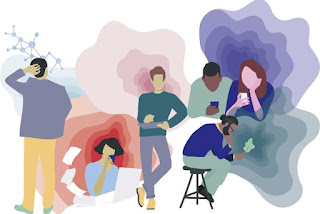How Do Mental Health Diseases Affect Daily Life?
Mental health diseases have become
increasingly prevalent in today's society, with more and more people seeking
help for various psychological issues. In fact, according to the World Health
Organization, one in four people in the world will be affected by mental or
neurological disorders at some point in their lives. As a result, it is
important to understand how these diseases can affect daily life, and the role
of a psychiatrist in Bhopal in addressing these challenges.
First and foremost, mental health
diseases can have a significant impact on an individual's daily routine and
functioning. Conditions such as depression, anxiety, and bipolar disorder can
cause a range of symptoms that can affect a person's ability to carry out
everyday tasks. For example, someone with depression may struggle with low
energy and motivation, making it difficult to complete work or household
chores. Similarly, someone with anxiety may experience constant worry and fear, which can interfere
with their ability to socialize or attend important events.
Moreover, mental health diseases can
also affect one's physical health. The mind and body are closely connected, and
when one is suffering, the other is likely to be affected as well. For
instance, chronic stress and anxiety can lead to physical symptoms such as
headaches, muscle tension, and digestive issues. In more severe cases, mental
health diseases can also increase the risk of developing chronic health
conditions like heart disease and diabetes.
In addition to the individual, mental
health diseases can also impact the lives of family members, friends, and
colleagues. When a loved one is struggling with a mental health condition, it
can be challenging for those around them to understand and support them. This
can lead to strained relationships, feelings of guilt, and a sense of
helplessness. In the workplace, mental health diseases can also affect
productivity and teamwork, as well as create a stigma that prevents individuals
from seeking help.
This is where the role of a psychiatrist in Bhopal becomes crucial. A psychiatrist is a
medical doctor who specializes in diagnosing and treating mental health
disorders. They have the expertise and training to understand the complexities
of these diseases and provide effective treatment options. Through therapy,
medication, and other interventions, a psychiatrist can help individuals manage
their symptoms and improve their daily functioning.
Furthermore, psychiatrists also play
a vital role in educating and raising awareness about mental health. In a
society where there is still a stigma surrounding mental health, psychiatrists
can help break down barriers and promote understanding and acceptance. They can
also provide support and guidance to families and friends of those affected.



Comments
Post a Comment